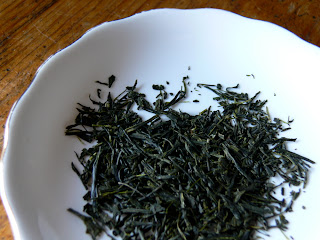I came across the company at the Collingwood Children's Farm farmers' market a few months ago and purchased some of their first (spring) harvest tea. I haven't tried the regular green tea yet, but I have been greatly enjoying the first harvest one (in fact am nearly out of it).
Sometimes I brew a smaller amount of leaf with low-temperature water, for about 2 minutes at a time (2-3 infusions), sometimes with lots of leaf for very short infusions (30 secs or so) in boiling water. Either way it is delicious. There are unique flavours that I haven't come across in a Japanese sencha. The taste profile is similar - the roasty, savoury taste for example - but there are also at times fruity notes, even floral ones, and sometimes an extremely distinct smell & taste that I can only describe as 'fresh dairy cream'. In some ways this tea makes me think more of an oolong than a sencha. I guess this is the effect of terroir at work.
The Alpine Tea Co teas are very reasonably priced too, and I am thinking that at $50-$65 a kilo a substantial purchase might not go amiss... especially at the rate I have been drinking sencha lately.
Interestingly, the company states on their website that
to ensure no direct comparison to Japanese Sencha (ours is not as strong), we prefer to call it Australian Green Tea.What do you think about that? I know that green tea grown in China and processed as for sencha is sold labelled as such - I believe that this is because the Japanese tea industry alone simply can't meet the full market demand for sencha. I think that so long as it is also labelled with its country of origin and not purported to be Japanese that there is no harm in calling it 'sencha' as well, or 'sencha-style' - and that this even opens up the opportunity for people to celebrate more diverse flavours and taste profiles.
*I expect (though this is speculation on my part) that this production decision was at least partly influenced by the fact that sencha processing is almost entirely mechanised, from harvest to finish - given the high cost of labour in Australia, I imagine that a hand-plucked and processed tea would be beyond exorbitant in price.

Interesting post - I've heard about this Australian tea, and would of course love to try it. However, it would be hard to come by, so I guess it's not going in my teacup anytime soon.
ReplyDeleteAs to whether it should be called Sencha, I'd prefer it wasn't because Sencha is a Japanese word, so I'd rather it applied only to green tea from Japan. Why shouldn't other countries create their own names for this tea? However, it seems that using a more "exotic" sounding name for tea sells better :)
Just my two cents, no - make that - tea leaves on this matter.
J.
We have Australian green tea at the Tea Centre and call it "Australian Sencha." I don't think there's anything wrong with that, like you said, as long as the country of origin is stated.
ReplyDeleteIt's wonderful that Australia makes some tea. This really is a great country.
I would support calling this tea sencha, and the same for Chinese teas, Vietnamese teas (which I've sampled as well), and any tea produced in the same style as Japanese sencha. Sencha is a very simple word in Japanese, with the unit sen(煎) just meaning boiling or pan-frying (a little unclear about what this is a reference to, as I've seen conflicting explanations). It's not like Keemun or Pu-erh, where the name refers to a specific region.
ReplyDeleteI do think that it's important to label where a tea is from. I think it's marginally dishonest to say sencha without identifying the country of origin if the country of origin is not Japan, and I think it is outright fraudulent to claim something is "Japanese sencha" when it's from China--even if the company claims it means "Japanese-style sencha".
I've classified sencha on RateTea.net in this way; currently we have sencha listed from five different countries--including Brazil! (Australia isn't listed yet; I need to get on that!)
Tease Tea have awesome Green Tea! http://www.teasetea.com.au/
ReplyDeleteCool and I have a swell proposal: Where To Loan For House Renovation house renovation for sale
ReplyDelete